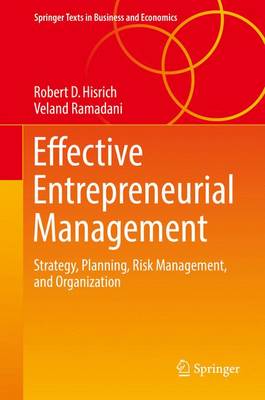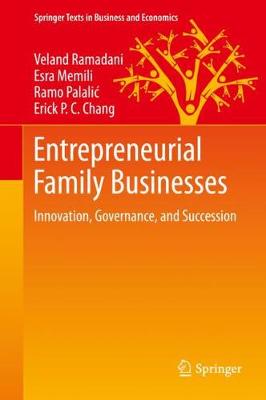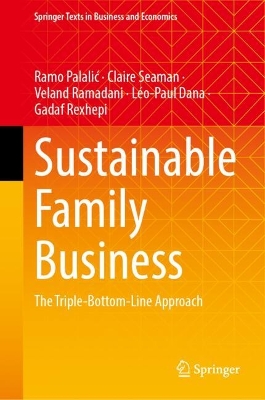Springer Texts in Business and Economics
3 total works
Effective Entrepreneurial Management
by Robert D Hisrich and Veland Ramadani
This textbook provides a comprehensive overview of the essential issues in effective entrepreneurial management. It first introduces readers to the fundamentals of entrepreneurial management, the nature of entrepreneurial managers and business planning, before exploring the specific topics of creativity and innovation, risk management, entrepreneurial marketing and organization as well as financing. The authors then move to contemporary topics such as entrepreneurial growth strategies, e-commerce challenges, ethical and socially responsible entrepreneurial management, franchising, and managing entrepreneurial family ventures. Each chapter provides a case study and several practice-based examples to help explain the concepts.
By providing a truly international approach, this text offers ample theoretical and empirical insights into entrepreneurship and small business management. It is a valuable and up-to-date resource for teachers and students of entrepreneurship.
Entrepreneurial Family Businesses
by Veland Ramadani, Esra Memili, Ramo Palalic, and Erick P.C. Chang
This book provides an extensive overview of family business-related topics such as context and uniqueness, lifecycle and ownership configurations, conflict management, corporate governance, succession challenges, internationalization, innovation, and socioemotional wealth. Each chapter features clear learning objectives, key concepts and terminology, and dedicated case studies to demonstrate the main messages. The book not only considers the day-to-day dynamics in family businesses, but also places substantial emphasis on the entrepreneurial skills needed for these businesses to survive and thrive, today and tomorrow. In addition, it elaborates and discusses a number of best practice examples, which offer valuable guidance not only for scholars, but also for students who wish to study these challenges.
Sustainable Family Business
by Ramo Palalić, Claire Seaman, Veland Ramadani, Léo-Paul Dana, and Gadaf Rexhepi
This book introduces a 'triple-bottom-line' approach to the concept and practice of family business sustainability. It is geared towards a broad audience covering social, economic, and environmental issues, to focus on implementation of sustainable practices. Having this in mind, this book provides possible ways of successfully managing family businesses in a sustainable manner, which should also lead to long-term business longevity.
The social perspectives addressed by this book discuss the social responsibility of the family business, using a two-way approach contributing to the development of society. The economic outlook is introduced by aiming at a sustainable competitive advantage with an economic impact, and how a family business should adapt to changes and be proactive to gain economic sustainability. The environmental dimension is focused on actions against global warming and global agreements aimed at businesses to change their policies to prioritize the environment as part of their strategy. This book thus explores possibilities for family firms to add values along all chains in business activities and to contribute to introducing green environment products, or environmentally safe products.
Each part of the book represents an important pillar of the family business unit that helps the firm to achieve and sustain its competitive advantage using the triple-bottom-line approach. Besides the objectives and the content, each chapter provides one short story applicable to a chapter's content and a case study for each chapter or topic. As learning tools besides case studies, the book provides key summaries, terminology, group assignments, and projects.


